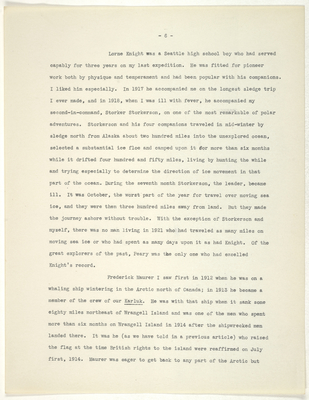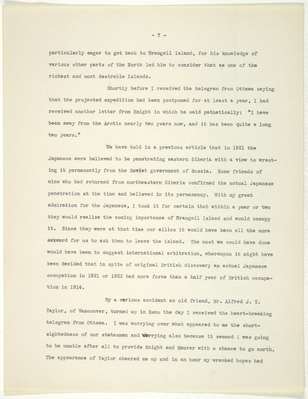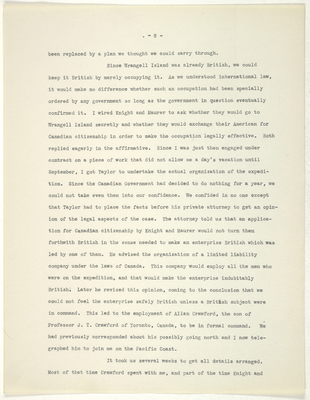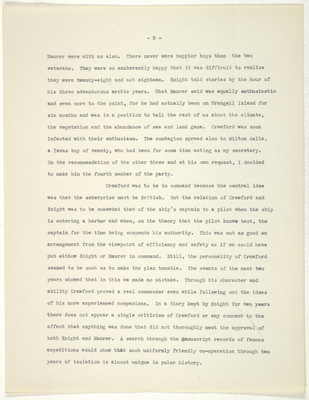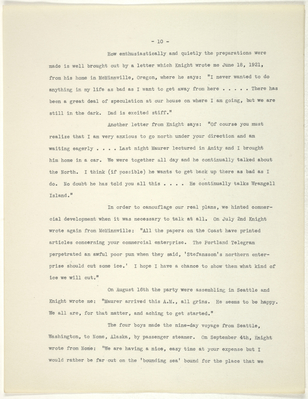Pages
stefansson-wrangel-09-25-005-006
6
Lorne Knight was a Seattle high school boy who had served capably for three years on my last expedition. He was fitted for pioneer work both by physique and temperament and had been popular with his companions. I liked him especially. In 1917 he accompanied me on the longest sledge trip I ever made, and in 1918, when I was ill with fever, he accompanied my second-in-command, Storker Storkerson, on one of the most remarkable of polar adventures. Storkerson and his four companions traveled in mid-winter by sledge north from Alaska about two hundred miles into the unexplored ocean, selected a substantial ice floe and camped upon it for more than six months while it drifted four hundred and fifty miles, living by hunting the while and trying especially to determine the direction of ice movement in that part of the ocean. During the seventh month Storkerson, the leader, became ill. It was October, the worst part of the year for travel over moving sea ice, and they were then three hundred miles away from land. But they made the journey ashore without trouble. With the exception of Storkerson and myself, there was no man living in 1921 who had traveled as many miles on moving sea ice or who had spent as many days upon it as had Knight. Of the great explorers of the past, Peary was the only one who had excelled Knight's record.
Frederick Maurer I saw first in 1912 when he was on a whaling ship wintering in the Arctic north of Canada; in 1913 he became a member of the crew of our Karluk. He was with that ship when it sank some eighty miles northeast of Wrangell Island and was one of the men who spent more than six months on Wrangell Island in 1914 after the shipwrecked men landed there. It was he (as we have told in a previous article) who raised the flag at the time British rights to the island were reaffirmed on July first, 1914. Maurer was eager to get back to any part of the Arctic but
stefansson-wrangel-09-25-005-007
- 7 -
particularly eager to get back to Wrangell Island, for his knowledge of various other parts of the North led him to consider that as one of the richest and most desirable islands.
Shortly before I received the telegram from Ottawa saying that the projected expedition had been postponed for at least a year, I had received another letter from Knight in which he said pathetically: "I have been away from the Arctic nearly two years now, and it has been quite a long two years."
We have told in a previous article that in 1921 the Japanese were believed to be penetrating eastern Siberia with a view to wresting it permanently from the Soviet government of Russia. Some friends of mine who had returned from northeastern Siberia confirmed the actual Japanese penetration at the time and believed in its permanency. With my great admiration for the Japanese, I took it for certain that within a year or two they would realize the coming importance of Wrangell Island and would occupy it. Since they were at that time our allies it would have been all the more awkward for us to ask them to leave the island. The most we could have done would have been to suggest international arbitration, whereupon it might have been decided that in spite of original British discovery an actual Japanese occupation in 1921 or 1922 had more force than a half year of British occupation in 1914.
By a curious accident an old friend, Mr. Alfred J. T. Taylor, of Vancouver, turned up in Reno the day I received the heart-breaking telegram from Ottawa. I was worrying over what appeared to me the shortsightedness of our statesmen and worrying also because it seemed I was going to be unable after all to provide Knight and Maurer with a chance to go north. The appearance of Taylor cheered me up and in an hour my wrecked hopes had
stefansson-wrangel-09-25-005-008
.- 8 -
been replaced by a plan we thought we could carry through.
Since Wrangell Island was already British, we could keep it British by merely occupying it. As we understood international law, it would make no difference whether such an occupation had been specially ordered by any government so long as the government in question eventually confirmed it. I wired Knight and Maurer to ask whether they would go to Wrangell Island secretly and whether they would exchange their American for Canadian citizenship in order to make the occupation legally effective. Both replied eagerly in the affirmative. Since I was just then engaged under contract on a piece of work that did not allow me a day’s vacation until September, I got Taylor to undertake the actual organization of the expedition. Since the Canadian Government had decided to do nothing for a year, we could not take even them into our confidence. We confided in no one except that Taylor had to place the facts before his private attorney to get an opinion of the legal aspects of the case. The attorney told us that an application for Canadian citizenship by Knight and Maurer would not turn them forthwith British in the sense needed to make an enterprise British which was led by one of them. He advised the organization of a limited liability company under the laws of Canada. This company would employ all the men who were on the expedition, and that would make the enterprise indubitably British. Later he revised this opinion, coming to the conclusion that we could not feel the enterprise safely British unless a British subject were in command. This led to the employment of Allan Crawford, the son of Professor J. T. Crawford of Toronto, Canada, to be in formal command. We had previously corresponded about his possibly going north and I now telegraphed him to join me on the Pacific Coast.
It took us several weeks to get all details arranged. Most of that time Crawford spent with me, and part of the time Knight and
stefansson-wrangel-09-25-005-009
- 9 -
Maurer were with us also. There never were happier boys than the two veterans. They were so exuberantly happy that it was difficult to realize they were twenty-eight and not eighteen. Knight told stories by the hour of his three adventurous arctic years. What Maurer said was equally enthusiastic and even more to the point, for he had actually been on Wrangell Island for six months and was in a position to tell the rest of us about the climate, the vegetation and the abundance of sea and land game. Crawford was soon infected with their enthusiasm. The contagion spread also to Milton Galle, a Texas boy of twenty, who had been for some time acting as my secretary. On the recommendation of the other three and at his own request, I decided to make him the fourth member of the party.
Crawford was to be in command because the central idea was that the enterprise must be British. But the relation of Crawford and Knight was to be somewhat that of the ship's captain to a pilot when the ship is entering a harbor and when, on the theory that the pilot knows best, the captain for the time being suspends his authority. This was not as good an arrangement from the viewpoint of efficiency and safety as if we could have put either Knight or Maurer in command. Still, the personality of Crawford seemed to be such as to make the plan tenable. The events of the next two years showed that in this we made no mistake. Through his character and ability Crawford proved a real commander even while following out the ideas of his more experienced companions. In a diary kept by Knight for two years there does not appear a single criticism of Crawford or any comment to the effect that anything was done that did not thoroughly meet the approval of both Knight and Maurer. A search through the manuscript records of famous expeditions would show that such uniformly friendly co-operation through two years of isolation is almost unique in polar history.
stefansson-wrangel-09-25-005-010
- 10 -
How enthusiastically and quietly the preparations were made is well brought out by a letter which Knight wrote me June 18, 1921, from his home in McMinnville, Oregon, where he says: "I never wanted to do anything in my life as bad as I want to get away from here . . . . . There has been a great deal of speculation at our house on where I am going, but we are still in the dark. Dad is excited stiff."
Another letter from Knight says: "Of course you must realize that I am very anxious to go north under your direction and am waiting eagerly . . . . Last night Maurer lectured in Amity and I brought him home in a car. We were together all day and he continually talked about the North. I think (if possible) he wants to get back up there as bad as I do. No doubt he has told you all this . . . . He continually talks Wrangell Island."
In order to camouflage our real plans, we hinted commercial development when it was necessary to talk at all. On July 2nd Knight wrote again from McMinnville: "All the papers on the Coast have printed articles concerning your commercial enterprise. The Portland Telegram perpetrated an awful poor pun when they said, 'Stefansson's northern enterprise should cut some ice.' I hope I have a chance to show them what kind of ice we will cut."
On August 16th the party were assembling in Seattle and Knight wrote me: "Maurer arrived this A.M., all grins. He seems to be happy. We all are, for that matter, and aching to get started."
The four boys made the nine-day voyage from Seattle, Washington, to Nome, Alaska, by passenger steamer. On September 4th, Knight wrote from Nome: "We are having a nice, easy time at your expense but I would rather be far out on the 'bounding sea' bound for the place that we
